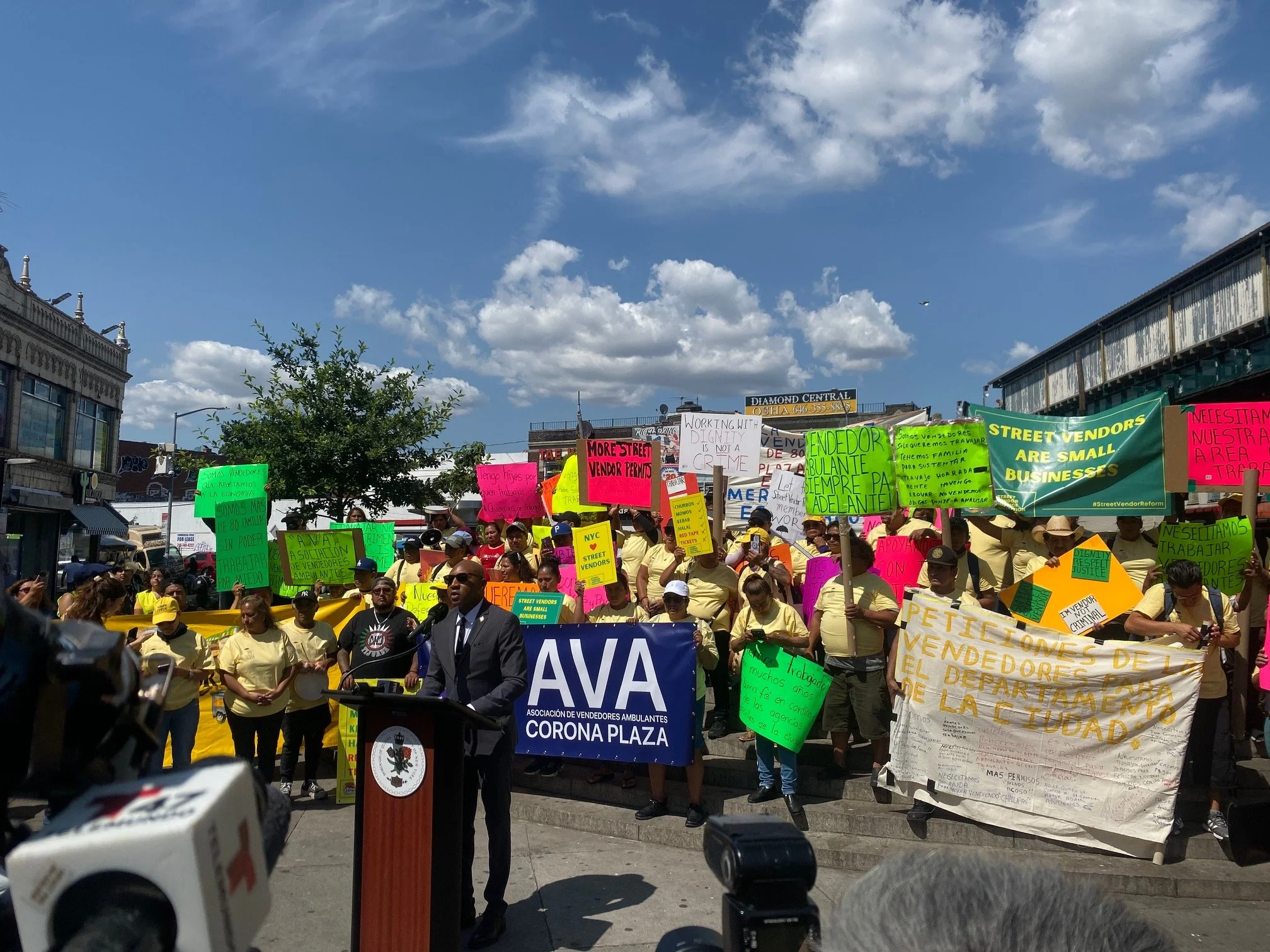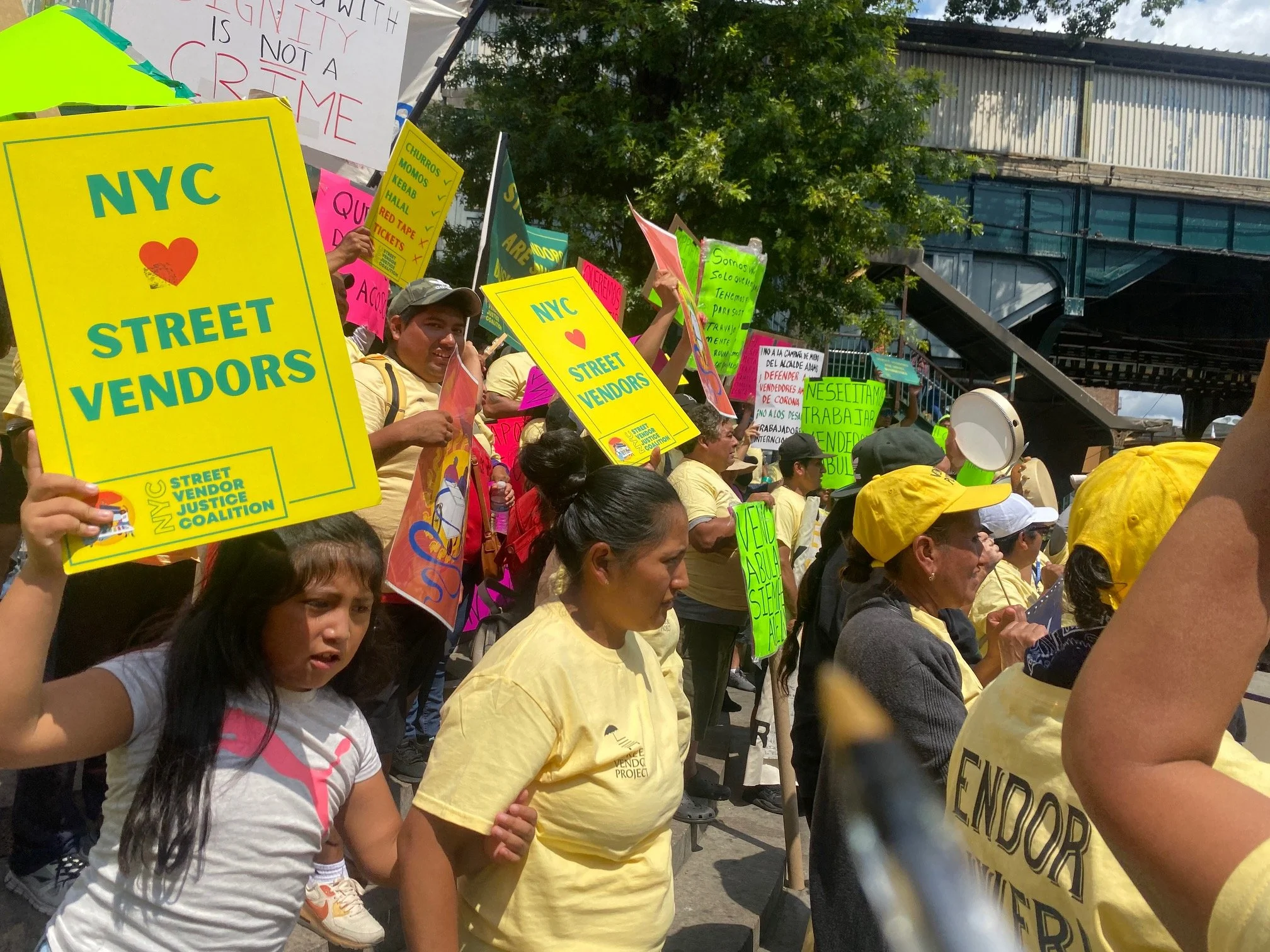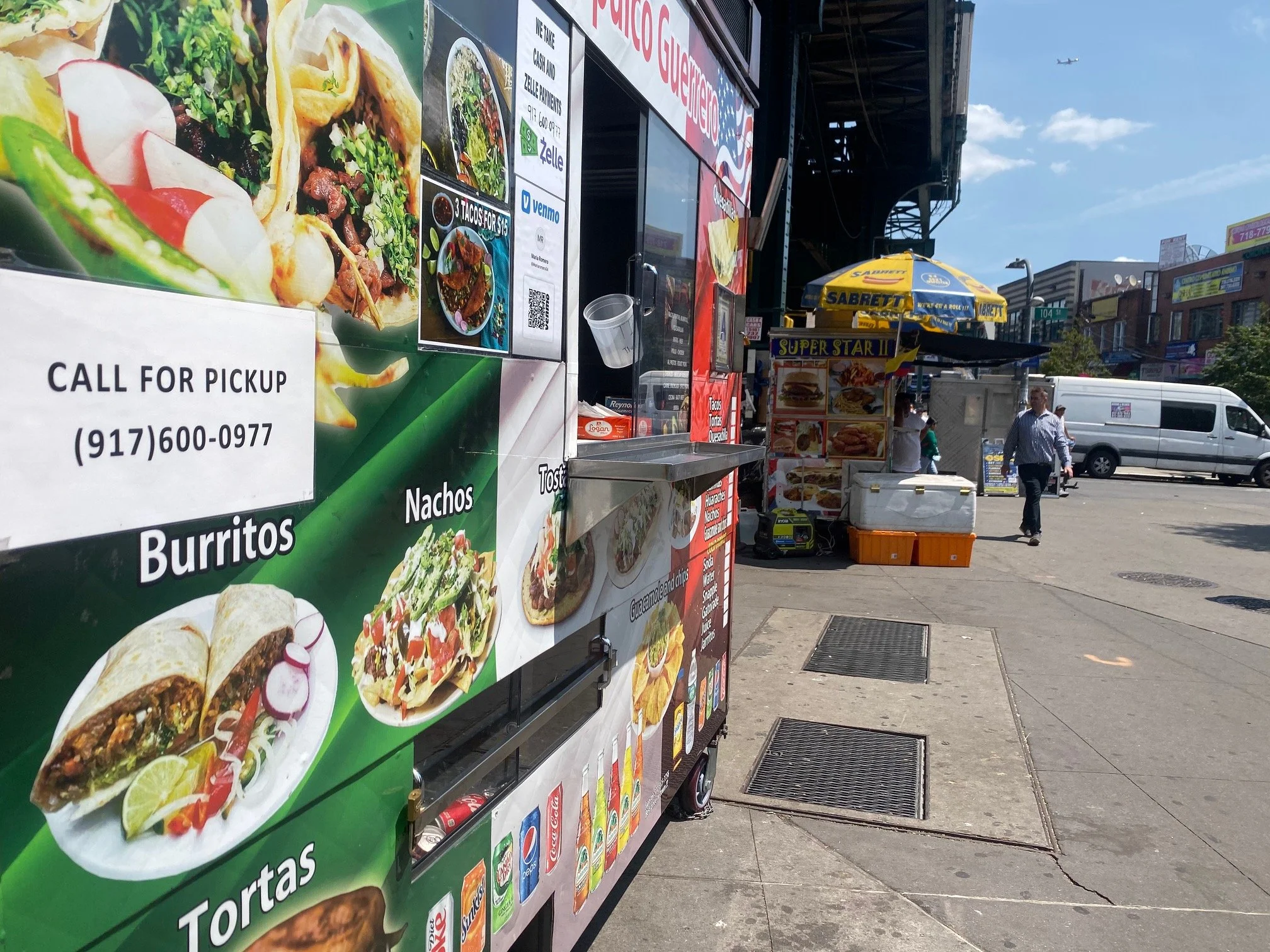Queens officials defend food vendors in Corona Plaza
/Elected officials, vendors and advocates rallied against a late night sweep of illegal vendors at the popular Corona Plaza in Queens on Wednesday. Eagle photo by Ryan Schwach
By Ryan Schwach
A Queens locale known for its vibrancy and culture was the site of a late night city crackdown on illegal vendors last week, done with little notice to the vendors or local elected officials, who held a rally on Wednesday protesting what they said was heavy-handed enforcement from the city.
Officials and vendors rallied on Wednesday at Corona Plaza, an area characterized by its Latin American street vendors selling tacos and elote, nearly 80 of whom were kicked out of the area by Department of Sanitation employees last week. Advocates called the vendor sweep “disturbing and infuriating,” and said the enforcement isn’t fair to the mostly immigrant vendors who struggle to obtain permits to operate above the board.
“This plaza we’re standing in today is more than just a slab of concrete underneath a noisy subway line,” said Queens Borough President Donovan Richards. “It's one of the 15 best places to eat in New York City, this plaza is the hub of culture and cuisine that defines who we are as the World’s Borough…it symbolizes all that we are as Queens residents.”
According to vendors and vending advocate group the Street Vendor Project, city sanitation officials came to Corona Plaza last Wednesday and issued a 24-hour warning to vendors to vacate the plaza, and then came back the next day late at night and began kicking those without permits out.
“Someone called me on the phone and I came here immediately,” said Rosario Troncoso, the president of the recently established Corona Plaza Street Vendors Association.
She said that when she arrived, sanitation workers were asking for permits and confiscating materials and merchandise.
“We haven't been able to have income for the last several days,” Troncoso told the Eagle through a translator. “We're unable to pay for rent, our bills or food.”
While many of the vendors have been eradicated, the sanitation police have not, she said. Over the past several days, the sanitation workers have remained, preventing vendors from setting up shop again.
According to the Street Vendor Project, 78 vendors were evicted from Corona Plaza on Thursday. The raid came only about a week after the New York Times highlighted the plaza vendors as a destination for food in New York City.
“These are women of color with kids, many who come to this plaza every day to feed their families, to feed the community and to truly be a gem of Queens. So what do you want them to do?” said Richards. “It is chilling and treating the vendors like criminals is disgusting. It's immoral, and is simply anti-American.”
Local vendors said that they were given a 24-hour notice to vacate Corona Plaza, and had goods and materials confiscated during a late night sweep last week. They rallied against the enforcement action on Wednesday, Aug. 2, 2023. Eagle photo by Ryan Schwach
Other local Queens officials argued that the vendors are the heart of the community, and are mostly immigrants with families and children, looking to make their own way in New York City.
“We need to get together on the same page, we have to support the way of life that people have made for themselves so that we do not increase the number of homelessness and the number of people out on the streets, because the city has prevented their ability to support themselves,” said Representative Alexandria Ocasio-Cortez. “It makes no sense.”
“The answer is to let them grow, not kick them out,” she added.
The officials linked the sweep to the city’s asylum seeker crisis, which reached new heights this week.
“We cannot have city officials running to Washington, asking them for work authorizations, then on the other hand, removing people's ability to work here,” Ocasio-Cortez said.
Overall, advocates argued that the vendors are a piece of the community.
“This is a community that during the darkest hours of our city, the darkest hours of Queens, made sure that our community was fed, made sure that we were taken care of and our families were taken care of while they take care of their families,” said Assemblymember Steven Raga. “You do not treat Queens people this way.”
Street vendors were still operating at Corona Plaza on Wednesday, a little less than a week after a late night sweep of illegal vending operations. Eagle photo by Ryan Schwach
However, not everyone was on the street vendors side. Two locals, Ramses Massiel and Frias Lugo, who called themselves “concerned citizens,” heckled every elected official who spoke, saying that safety and cleanliness are an issue at Corona Plaza, and the vendors, who they say should work legally, are at fault.
“No other adjoining neighborhoods look like this,” Massiel told the Eagle after the rally.
He noted the trash on the street and sidewalks and the pigeon droppings, blaming the vendors for both.
“Why here?” he said.
Massiel and Frias aren’t the only ones – Councilmember Francisco Moya says his office gets 18 to 20 complaints about the vendors per week, and that locals and surrounding brick and mortar business owners have had enough.
“The complaints are from cleanliness to legal vendors who are threatened by the [illegal] vendors, storefront owners or business owners that complain about losing business, churches, schools, it comes from everywhere, this is not a one-off problem,” Moya said in a phone call with the Eagle on Wednesday. “The number of 311 complaints have gone through the roof in this area.”
“What is going on over there is just not something that the community is supporting,” Moya added. “This is having a detrimental impact on the quality of life there.”
Moya says that the state of Corona Plaza brings crime and is “disgusting” and “filthy.”
“That is not a place of destination,” he said.
Moya also says that local businesses are being hurt by the vendors, who are able to sell cheaper goods, and are being forced to move or close.
“There are business owners that are there paying taxes or getting ticketed, because of the dirty sidewalk…they're also immigrants,” he said. “That plaza was built so that it was an open space for people to enjoy and have a community space that's there, that's not what it's being utilized for.”
He also said that anyone who thinks that the conditions there are “ok,” is “severely disconnected with the community that resides there.”
When asked about Moya’s complaints about Corona Plaza during the rally, Richards accused the councilmember of not being “part of the solution” and instead being “part of the problem.”
The city itself defended its enforcement last week.
“As part of the Adams Administration's commitment to the health, safety, accessibility and cleanliness of our streets, the Department of Sanitation engaged in vending inspections and limited enforcement in Corona Plaza over two days last week,” a Sanitation Department spokesperson said. “This is a location where recent visits showed significant issues with cleanliness and pedestrian access.”
The spokesman said that Sanitation Police removed five vending setups that were abandoned, and issued one summons to a vendor for obstructing the sidewalk.
In late March, the city transitioned the enforcement of street vendors from the Department of Consumer and Worker Protection to the Sanitation Department, a move that received pushback from electeds and vendor advocates.
“Placing the enforcement of vendors in the hands of an agency that deals with trash sends the wrong message,” said Bronx Councilmember and Chair of the Sanitation Committee Sandy Nurse at a rally against that city decision in late March. “Our vendors are not trash. Street vendors represent the smallest businesses in New York City.”
Richards added on Wednesday that it is not just a Corona issue.
“You have this in Flushing, we have this in Jamaica – these issues are compounding and getting worse, because there's a real lack of political will to get something really done,” he said.
Earlier this year, Flushing Councilmember Sandra Ung led a campaign against illegal street vendors on Flushing’s Main Street, who she said posed a safety threat for pedestrians. Her calls for enforcement were met with a similar response from both City Hall and advocates.
Beyond the safety concerns, Moya, Ung and others urging for increased enforcement against illegal street vending say that it sets up unfair situations for legal businesses.
Councilmember Francisco Moya says that Corona Plaza’s conditions are chasing away locals. Mayor Eric Adams has been supportive of local councilmembers’ calls for enforcement against illegal vending. File photo courtesy of Moya
“Street vendors are not exempt to do whatever they like,” Moya said. “We have local business owners that are there that are being hurt by what's happening there.”
The sentiment was repeated by Massiel and Lugo, the duo who heckled the lawmakers during the rally on Wednesday. They frequently called on vendors to “follow the rules.”
But advocates and lawmakers at Wednesday’s rally said that procuring the licenses to legally sell food on the street is difficult to do.
“The conversation about following the rules, and getting a permit and waiting in line, it's very similar to the conversation that's being had around undocumented migration,” said State Assemblymember Catalina Cruz. “If these folks could get a license, you don't think they would choose to get a license?”
The Street Vendor Project’s Deputy Director Carina Kaufman-Gutierrez addressed Massiel and Lugo directly during her remarks.
“I want to educate you a little bit, because unfortunately, the rules of street vending are very difficult, very complicated,” she said.
Kaufman-Gutierrez said that there are only around 850 general vendor licenses available in the city, and “you cannot even get on the waitlist.”
Advocates say that it has been difficult for vendors to get the necessary legal permission to operate and they argue the number of permits should be raised.
“This is only illegal activity because the city won't raise the cap,” said Richards. “These individuals want to legally vend, but they cannot legally when the city has not expanded the licenses."
Despite his position on the current vending operation in Corona Plaza, Moya said that he agrees the caps should be eliminated or raised.
“I've worked with the Street Vendor Project, I voted in favor of the expansion of the licenses, I put in money to clean up the plaza,” he said.
On the state level, Queens State Assemblymember Jessica Gonzalez-Rojas and State Senator Jessica Ramos currently sponsor legislation which they said would break down the bureaucratic red tape for vendors and would “legalize and decriminalize sidewalk vending across the state.”
In March, the vendors around Corona Plaza formed their association as a way to formalize these efforts, and obtain a single concessionaires permit for all the plaza vendors.
“One of our biggest goals is to be able to get some sort of agreement with the city to be able to work here legally,” Tronsoco said.
However, Street Vendor Association Managing Director Mohammad Attia says that the process, which is required to go through the Department of Transportation, is moving “very slow.”
“We want to be respected,” said Troncoso. “We are here contributing to the economy of Corona.”







